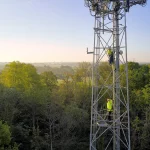Vodafone Launch Scam Signal to Tackle UK Impersonation Fraud

Telecoms giant Vodafone UK, specifically their business focused Carrier Services (wholesale) division, has launched a new service called Scam Signal that allows businesses to protect their customers from impersonation scams, such as Authorised Pushed Payment (APP) fraud.
APP fraud typically involves a criminal tricking someone into sending them money, often through impersonating representatives from banks, government departments, or even a family member. They can also deceive a victim into making advance payments for fraudulent investments, counterfeit goods and services, or even extort money through a seemingly genuine romance or friendship.
The new Scam Signal service, which is part of Vodafone’s suite of Application Programmable Interfaces (APIs), is designed to tackle this by enabling financial institutions to identify and thwart fraudulent bank transfers as they occur in real-time. The system leverages advanced analysis of real-time network data during live transactions to help it detect and mitigate social engineering attempts aimed at deceiving and defrauding account holders.
Advertisement
Statistics published by the UK government show that 1 in 15 people have fallen victim to fraudulent activity. In 2022, more than £485m was lost to APP fraud alone. As new UK legislation mandates that banks reimburse customers for fraudulent transaction losses, financial institutions are looking to adopt better protections to help tackle the problem.
Fanan Henriques, Director of Vodafone Business International and EU Cluster, said:
“Vodafone is using the intelligence in our networks to help financial institutions to protect consumers by tackling fraud at its source. Scam Signal provides both end users and banks with an additional layer of protection against scammers and peace of mind that their transactions are legitimate.”
Scam detection is said to have improved by 30% after only three months of a successful pilot of this service with a leading UK bank. At present the service is only being made available to businesses in the UK, but other markets are planned to follow.
The introduction builds on the launch of other APIs in several markets to improve online verification and security, including SIM Swap and Number Verify (see details). These APIs use common open standards defined by the global alliance CAMARA in conjunction with the GSMA industry body.
Mark is a professional technology writer, IT consultant and computer engineer from Dorset (England), he also founded ISPreview in 1999 and enjoys analysing the latest telecoms and broadband developments. Find me on X (Twitter), Mastodon, Facebook, BlueSky, Threads.net and Linkedin.
« Broadband ISP Fibrus Launch 2024 Rural Community Fund with £120k






















































Then the answer is simple: take back your customer services away from india. That is where 99.99% of scamming is taking place. Then what is to do? Well, use government pressure to actively prosecute these scammers and hunt down their money mules who launder for them.
This sentiment is not the way forward. You’d be surprised how heavily UK based call centres rely on Indian back office staff to get things done.
Basically, they greet you, figure out what needs to be done, get the Indian back office team to do the heavy lifting, and basically just read out the outcome to you in their British accents. It may sound silly but it’s true.
While I agree that the UK needs to bring all call centres back to the UK. I don’t agree that it is just the Indians doing the scams, India has some of the greatest minds in infosec, while it does have a large quantity of scammers, these are minimal in comparison to the infosec sector which the UK relies upon.
For the contact centre staff, most have been sent there to cut costs which consumers demand. Sadly I know many who lost their jobs to cost cutting measures
Our British employees (or Government) would never scam or do any sort of fraud or any criminal activities. lol
It does sound silly that others are doing the work while UK citizens read out their report. Never have I and so many others I have asked have heard this. It is mainly indians who are scamming, ask anyone of the scam hunters and they will tell you this – it is is clearly not “minimal”. NHS letters were being sent over to india to be typed up, but this has vastly reduced as clinical staff such as myself use Dragon speech to type software.